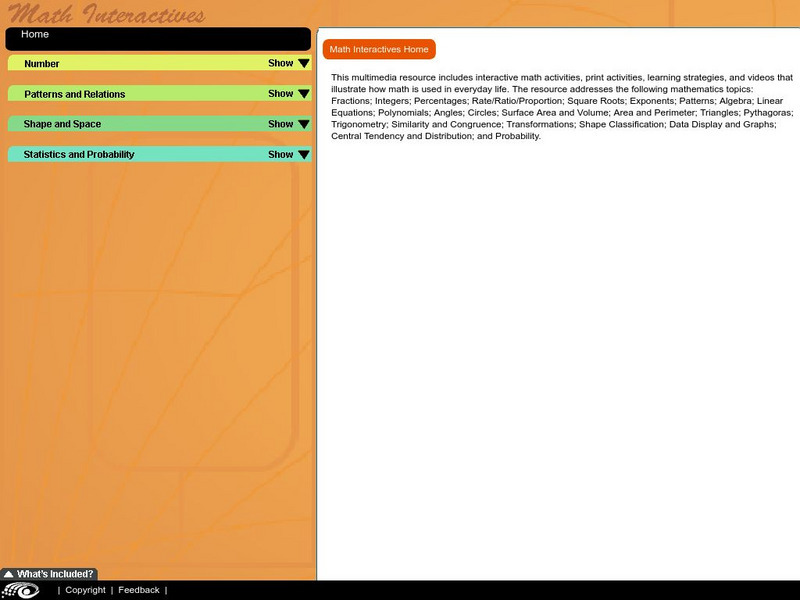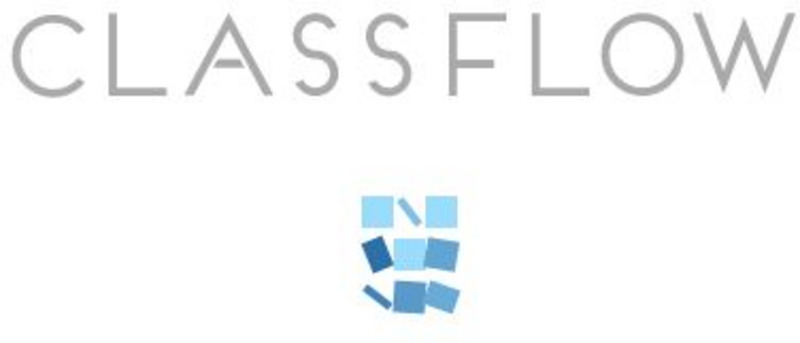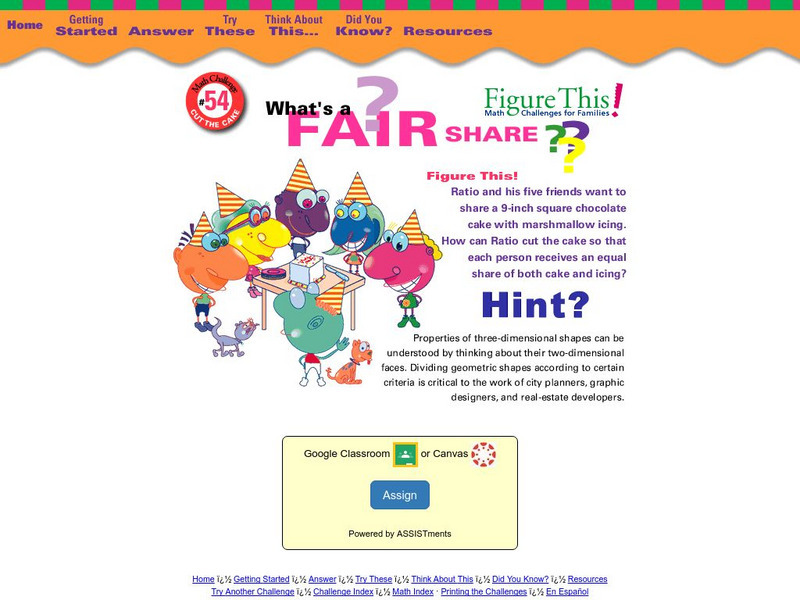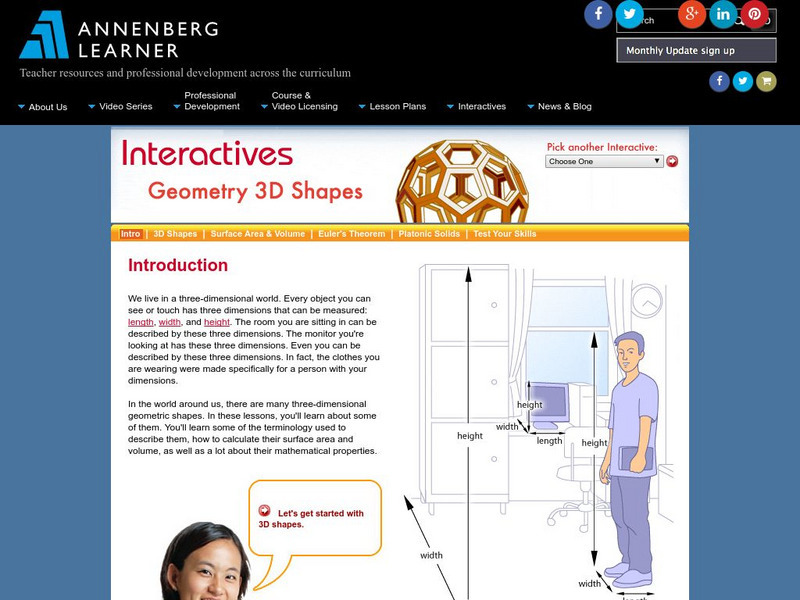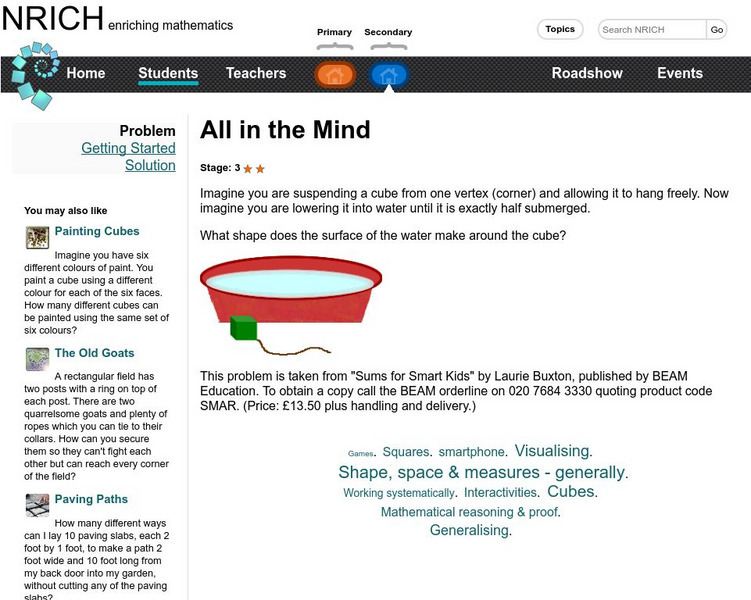Hi, what do you want to do?
Government of Alberta
Learn Alberta: Math Interactives: Exploring Surface Area, Volume, and Nets
Investigate the concepts of area, volume, 3D shapes, and nets using this interactive Learn Alberta math. The solid shapes focused on this exploration include rectangular and triangular prisms, rectangular and triangular pyramids,...
Mr. Martini's Classroom
Mr. Martini's Classroom: Volume: Geometry Practice Solving Volumes
Students solve for the volume of three-dimensional figures such as cubes, prisms, and cylinders with these interactive flashcards.
ClassFlow
Class Flow: Geometry Solid Figures
[Free Registration/Login Required] This flipchart discusses plane figures and solid figures.
National Council of Teachers of Mathematics
Nctm: Figure This: Cut the Cake
A math challenge where geometry, measurement, and problem solving meet. Explore the properties of three dimensional shapes when you discover how six friends can equally divide a nine inch square chocolate cake. A one page activity from...
ClassFlow
Class Flow: Geometry Polygons
[Free Registration/Login Required] This flipchart discusses plane figures and solid figures. The definitions and lesson sequence are based on Scott Foresman's Grade 4 Math textbook.
Annenberg Foundation
Annenberg Learner: Geometry 3 D Shapes
Learn about several three-dimensional geometric shapes and the terminology used to describe them. Learn how to calculate their surface area and volume, and explore their mathematical properties.
CK-12 Foundation
Ck 12: Geometry: Heights of Cylinders Given Surface Area
[Free Registration/Login may be required to access all resource tools.] In this lesson students will find the heights of cylinders given surface area and one other dimension. Students examine guided notes, review guided practice, watch...
Annenberg Foundation
Annenberg Learner: Geometry 3 D Shapes: Polyhedra, Prisms, and Pyramids
An introduction to a type of three-dimensional shape called a polyhedron. See examples and play with an interactive animation, showing the faces, vertices, and edges of pyramids, which are a type of polyhedron.
Cuemath
Cuemath: 3 D Shapes
Introduces the concept of 3D shapes by learning the definition, types, properties, and three dimensions. Check-out the solved examples for better understanding and try your hand at solving a few interactive questions at the end of the page.
Khan Academy
Khan Academy: Surface Area Using Nets
Practice using the net of a 3D figure to find surface area. Students receive immediate feedback and have the opportunity to try questions repeatedly, watch a video or receive hints.
Alabama Learning Exchange
Alex: Cutting the Cheese
The students will find the area of each two dimensional figure on a net of a triangular prism. In groups, students will cut out the net and create a triangular prism. Groups will then discuss how to find the lateral area and the total...
Alabama Learning Exchange
Alex: Painting the Pyramids
The students will find the area of each two dimensional figure on a net of a square pyramid. In groups, students will cut out the net and create a square pyramid. Groups will then discuss how to find the lateral area and the total...
Alabama Learning Exchange
Alex: Thinking Outside the "Box"
The young scholars will find the area of each two dimensional figure on a net of a rectangular prism. In groups, students will cut out the net and create a rectangular prism. Groups will then discuss how to find the lateral area and the...
Alabama Learning Exchange
Alex: "Movin' on Up"
Students will use their knowledge of scale factor to enlarge a picture to scale. They will then use PhotoStory to create a collage of their pictures. This lesson plan was created as a result of the Girls Engaged in Math and Science...
Disfruta Las Matematicas
Disfruta Las Matematicas: Geometria
This unit could be used as supplementary material for Geometry. It has good examples with illustrations and some interactive activities.
Calculator Soup
Calculator Soup: Square Pyramid Calculator
Use this calculator to determine the volume, surface area, or other figure for a square pyramid, given the other numbers. Users set their parameters for two known variables of the pyramid and find what the unknown amounts would be.
University of Cambridge
University of Cambridge: Nrich: All in the Mind
You will have to use visualization to help you solve this challenge. At this one page website, you will be able to check your solution.
University of Cambridge
University of Cambridge: Nrich: Dicey
If you can visualize a cube and turn it around in your mind, then this is the challenge for you. This one page website has the solution available to check your thinking.
Khan Academy
Khan Academy: Cross Sections of 3 D Objects (Basic)
Match 3D objects with their 2D cross-sections. Students receive immediate feedback and have the opportunity to try questions repeatedly, watch a video or receive hints.
CK-12 Foundation
Ck 12: Cross Sections and Nets: Cereal Box Grid
[Free Registration/Login Required] Students will explore cross sections and nets of three dimensional objects. Click challenge me to answer practice questions and click learn more to watch a video.
Khan Academy
Khan Academy: Surface Area Using Nets
In this exercise, students practice finding the surface area using nets. Students receive immediate feedback and have the opportunity to get hints and try questions repeatedly.
Khan Academy
Khan Academy: Surface Area
In this exercise, students practice finding the surface area of 3D objects. Students receive immediate feedback and have the opportunity to get hints and try questions repeatedly.
CK-12 Foundation
Ck 12: Volume of Cylinder: Big Can of Soup
[Free Registration/Login Required] Students determine the volume of a cylinder by moving the points on the can of soup. Click challenge me to answer practice questions and click learn more to watch a video.
Khan Academy
Khan Academy: Nets of Polyhedra
Practice matching 2D nets to the 3D shapes the fold up into. Students receive immediate feedback and have the opportunity to try questions repeatedly, watch a video or receive hints.





